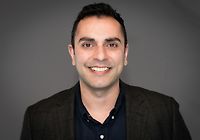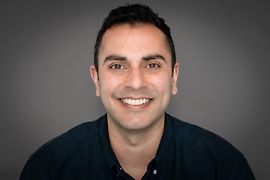Central Auckland, East Auckland, North Auckland, South Auckland, West Auckland > Private Hospitals & Specialists >
Amin Roberts - Paediatric Gastroenterologist
Private Service, Paediatrics, Gastroenterology, Hepatology
Today
8:00 AM to 5:00 PM.
Description
Dr Amin Roberts is a paediatric gastroenterologist and endoscopist in private practice at Auckland Medical Specialists (Epsom) and the MacMurray Centre (Remuera). He is also a consultant at Starship Children's Hospital - Department of Paediatric Gastroenterology, and a senior clinical lecturer at the University of Auckland's School of Medicine.
Dr Roberts sees any gastrointestinal (gut) or liver related issues in babies, young children and teenagers.
Symptoms/Conditions commonly reviewed include (but are not limited to the following):
- Abdominal pain
- Constipation
- Coeliac disease
- Gluten intolerance
- Rectal bleeding
- Vomiting
- Swallowing difficulties
- Altered bowel habits
- Cow's milk protein intolerance
- Gastro-oesophageal reflux
- Inflammatory bowel disease
- Chronic diarrhoea
- Oesophageal disorders
- Liver disease in infants and children
Clinic consultations are provided at Auckland Medical Specialists (Epsom), and private endoscopy services at the MacMurray Centre (Remuera).
Consultants
-

Dr Amin Roberts
Paediatrician
Ages
Child / Tamariki, Youth / Rangatahi
How do I access this service?
Referral
All patients require a referral from their GP or other specialist by emailing
referrals@aucklandmed.co.nz OR
admin@gastrokids.co.nz
Appointments can then be made either via email or by calling the clinic on 09 638 9945
Referral Expectations
Most new patients require a referral from their General Practitioner, General Paediatrician, Specialist Physician/Surgeon or other health professional.
Self-referrals will be seen in select circumstances
https://gastrokids.co.nz/contact
Fees and Charges Description
For clinic consultation fees please email referrals@aucklandmed.co.nz
For endoscopy fees please contact admin@macmurray.co.nz
Amin is a Southern Cross Affiliated Provider for consultations
Amin is an nib Health Partner
Hours
8:00 AM to 5:00 PM.
| Mon – Fri | 8:00 AM – 5:00 PM |
|---|---|
| Sat | 8:00 AM – 12:00 PM |
Procedures / Treatments
Gastroscopy allows examination of the upper part of the digestive tract i.e. oesophagus (food pipe), stomach and duodenum (top section of the small intestine), by passing a gastroscope (long, flexible tube with a camera on the end) through the mouth and down the digestive tract. Images from the camera are displayed on a television monitor. Sometimes a small tissue sample (biopsy) will need to be taken during the procedure for later examination at a laboratory. Sometimes, there is temporary throat discomfort after the procedure. It is rare that there are serious complications. Gastroscopy may be used to diagnose coeliac disease, stomach or bowel ulcers, tumours, gastritis etc. All procedures are conducted under sedation by a paediatric anaesthetist.
Gastroscopy allows examination of the upper part of the digestive tract i.e. oesophagus (food pipe), stomach and duodenum (top section of the small intestine), by passing a gastroscope (long, flexible tube with a camera on the end) through the mouth and down the digestive tract. Images from the camera are displayed on a television monitor. Sometimes a small tissue sample (biopsy) will need to be taken during the procedure for later examination at a laboratory. Sometimes, there is temporary throat discomfort after the procedure. It is rare that there are serious complications. Gastroscopy may be used to diagnose coeliac disease, stomach or bowel ulcers, tumours, gastritis etc. All procedures are conducted under sedation by a paediatric anaesthetist.
Gastroscopy allows examination of the upper part of the digestive tract i.e. oesophagus (food pipe), stomach and duodenum (top section of the small intestine), by passing a gastroscope (long, flexible tube with a camera on the end) through the mouth and down the digestive tract. Images from the camera are displayed on a television monitor. Sometimes a small tissue sample (biopsy) will need to be taken during the procedure for later examination at a laboratory. Sometimes, there is temporary throat discomfort after the procedure. It is rare that there are serious complications.
Gastroscopy may be used to diagnose coeliac disease, stomach or bowel ulcers, tumours, gastritis etc.
All procedures are conducted under sedation by a paediatric anaesthetist.
Colonoscopy is the examination of the colon (large bowel) using a colonoscope (long, flexible tube with a camera on the end). The colonoscope is passed into the rectum (bottom) and then moved slowly along the entire colon, while images from the camera are displayed on a television monitor. The procedure takes from 10 minutes to an hour. Sometimes a small tissue sample (biopsy) will need to be taken during the procedure for later examination at a laboratory. Occasionally there is temporary abdominal discomfort after the procedure. A small amount of bleeding from where the biopsies are taken is not uncommon. It is rare that there are serious complications. A colonoscopy may help diagnose conditions such as polyps (small growths of tissue projecting into the bowel), tumours, ulcerative colitis (inflammation of the colon). Colonoscopy may also be used to remove polyps in the colon. All procedures are undertaken under sedation by a paediatric anaesthetist.
Colonoscopy is the examination of the colon (large bowel) using a colonoscope (long, flexible tube with a camera on the end). The colonoscope is passed into the rectum (bottom) and then moved slowly along the entire colon, while images from the camera are displayed on a television monitor. The procedure takes from 10 minutes to an hour. Sometimes a small tissue sample (biopsy) will need to be taken during the procedure for later examination at a laboratory. Occasionally there is temporary abdominal discomfort after the procedure. A small amount of bleeding from where the biopsies are taken is not uncommon. It is rare that there are serious complications. A colonoscopy may help diagnose conditions such as polyps (small growths of tissue projecting into the bowel), tumours, ulcerative colitis (inflammation of the colon). Colonoscopy may also be used to remove polyps in the colon. All procedures are undertaken under sedation by a paediatric anaesthetist.
Colonoscopy is the examination of the colon (large bowel) using a colonoscope (long, flexible tube with a camera on the end). The colonoscope is passed into the rectum (bottom) and then moved slowly along the entire colon, while images from the camera are displayed on a television monitor. The procedure takes from 10 minutes to an hour. Sometimes a small tissue sample (biopsy) will need to be taken during the procedure for later examination at a laboratory. Occasionally there is temporary abdominal discomfort after the procedure. A small amount of bleeding from where the biopsies are taken is not uncommon. It is rare that there are serious complications.
A colonoscopy may help diagnose conditions such as polyps (small growths of tissue projecting into the bowel), tumours, ulcerative colitis (inflammation of the colon).
Colonoscopy may also be used to remove polyps in the colon.
All procedures are undertaken under sedation by a paediatric anaesthetist.
Online Booking URL
Public Transport
We recommend the Auckland Transport website.
This website will provide you with information on the public transport available in your area as well as prices, timetables and a journey planner.
Parking
There is parking available on site.
Pharmacy
Find your nearest pharmacies here
Website
Contact Details
Auckland Medical Specialists, 183 Gillies Avenue, Epsom, Auckland
Central Auckland
8:00 AM to 5:00 PM.
-
Phone
(09) 638 9945
-
Fax
(09) 638 9947
Healthlink EDI
akmdspec
Email
Website
Specialty Paediatrics
183 Gillies Avenue
Epsom
Auckland 1023
Street Address
Specialty Paediatrics
183 Gillies Avenue
Epsom
Auckland 1023
Postal Address
PO Box 99354
Newmarket
Auckland 1149
Was this page helpful?
This page was last updated at 9:34AM on February 23, 2026. This information is reviewed and edited by Amin Roberts - Paediatric Gastroenterologist.

